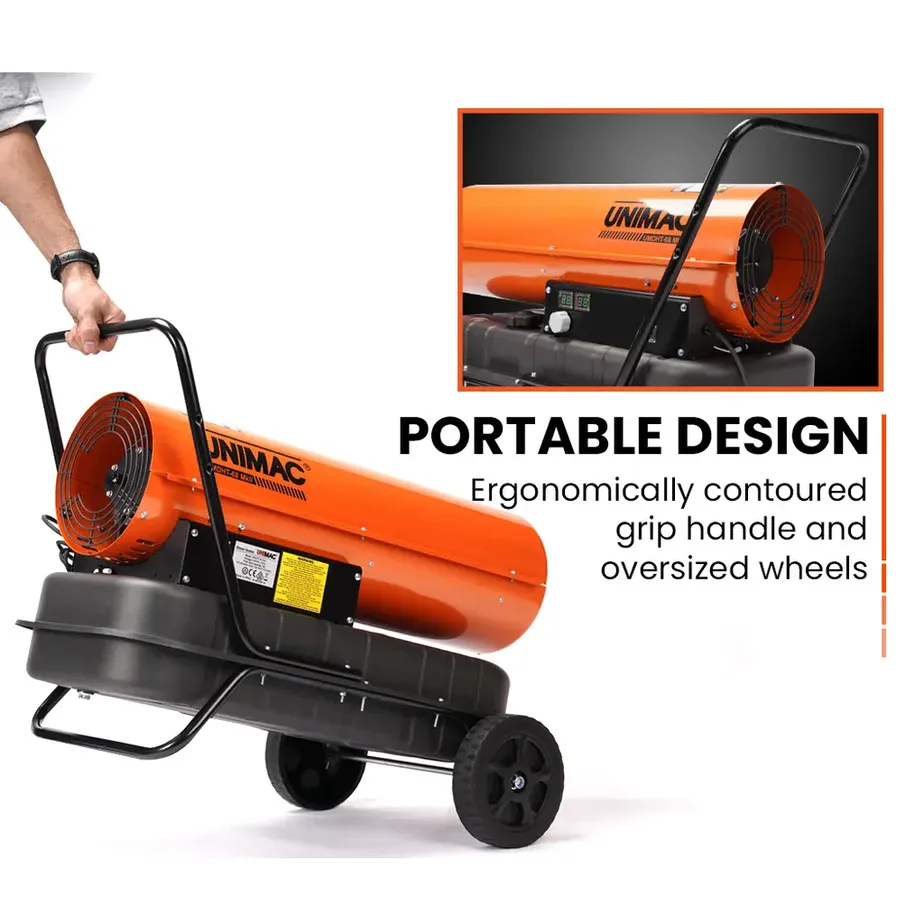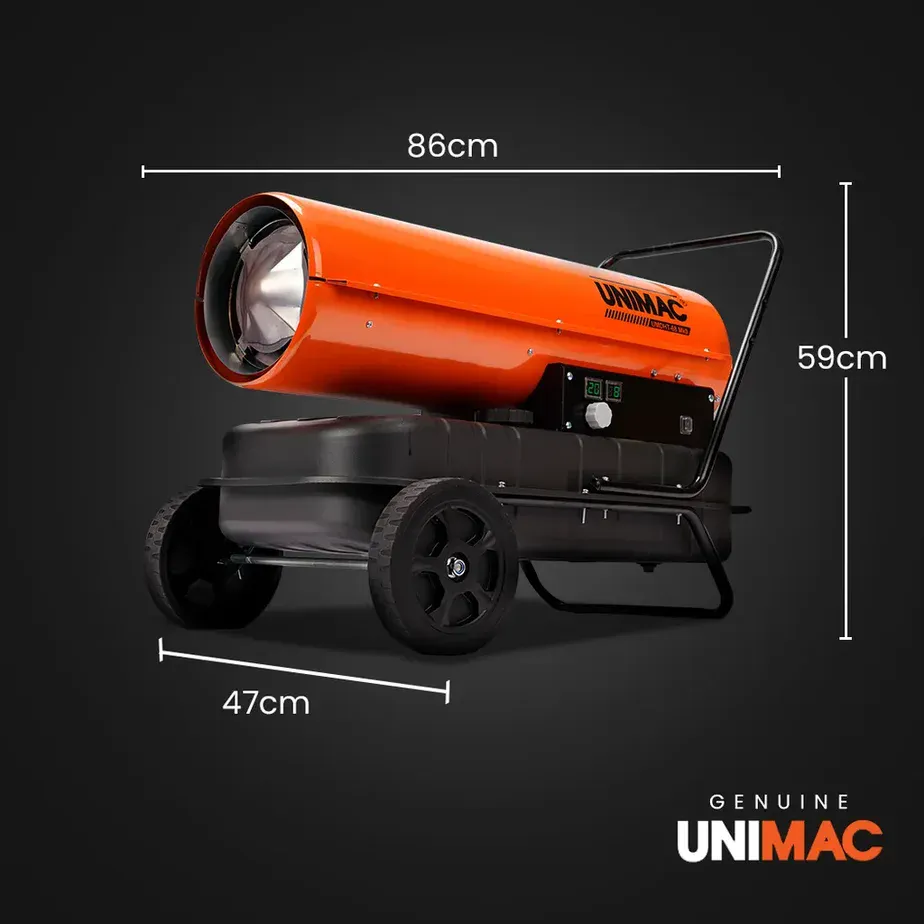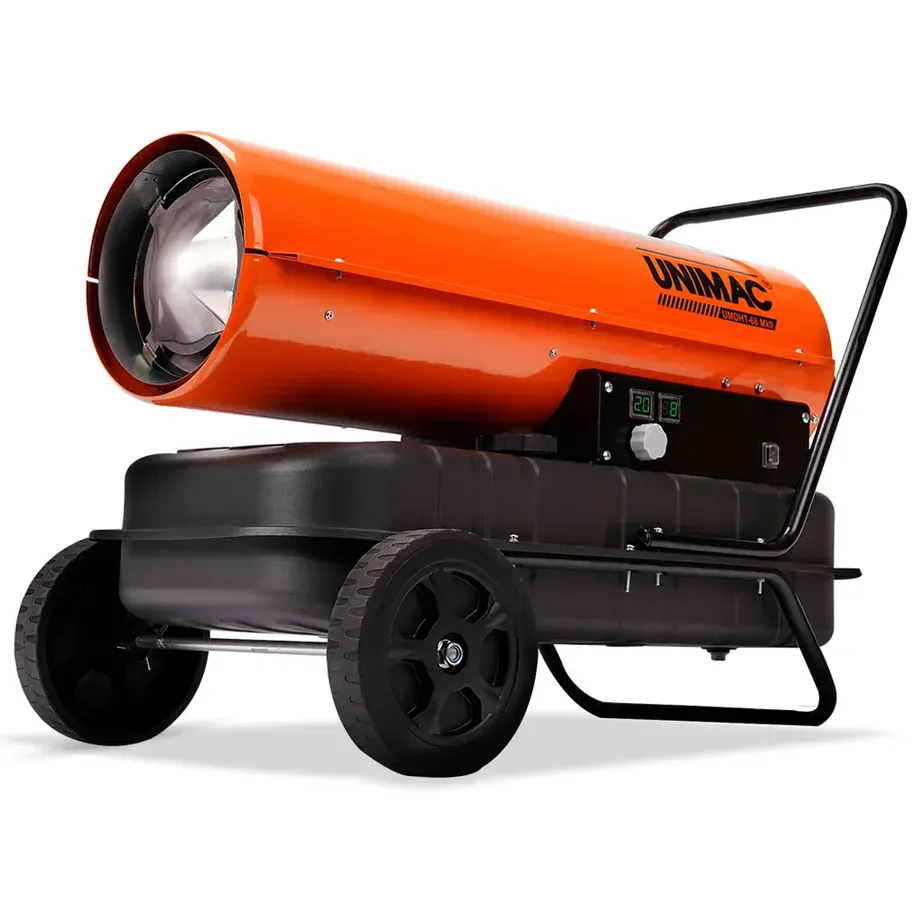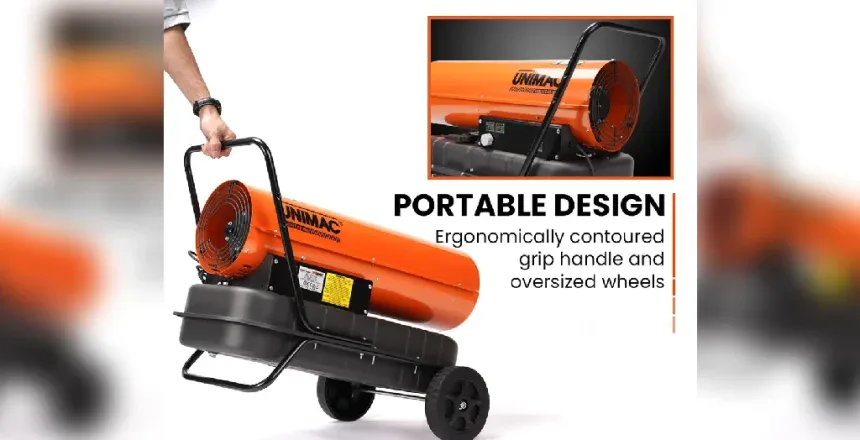UNIMAC 30kW Diesel Heater Review & Guide (Australia)
Excerpt: This practical review explains how the UNIMAC 30kW Diesel Heater works, who it suits, and how to operate it safely in Aussie workshops, sheds, and temporary sites. We cover benefits, limitations, maintenance, comparisons, and buying tips for both the public and emergency services.
Overview
The UNIMAC 30kW Diesel Heater (often called a direct‑fired “space heater”) is designed to push a large volume of warm air quickly into open or well‑ventilated spaces. For Australian users—tradies, farmers, community groups, and emergency responders—it’s a practical option for rapidly taking the chill off workshops, sheds, loading bays, and temporary work areas.
Direct‑fired heaters burn diesel to produce heat and a strong airflow. They’re valued for fast warm‑up times and simple operation. Unlike electric heaters, they don’t place heavy loads on the power supply, and unlike many gas options, you don’t need bottle swaps—standard diesel is widely available.
Because it’s direct combustion, by‑products (including carbon monoxide and water vapour) are present in the output air. That’s why ventilation is non‑negotiable. Think roller doors up, louvres open, or outdoor‑adjacent setups—never use in sealed or living areas, and always consider a CO alarm.
In emergency and recovery contexts, a 30kW unit balances portability with meaningful heat output. It can help keep teams warm between tasks, support drying of gear, and reduce cold‑related risks for volunteers and staff. Used correctly, it’s a safe, dependable tool for short‑term comfort and productivity.
In public settings (e.g., community halls under renovation, events marquees with open sides), competent operators can use a diesel space heater to create micro‑climates that make short work more comfortable. Planning, airflow, and supervision are the keys to doing this safely.
Key Features
Approx. 30kW Output
Delivers robust, fast heat for open or well‑ventilated spaces. Ideal for medium workshop bays, farm sheds, or temporary site shelters.
Direct‑Fired Airflow
Combines combustion and forced airflow to push warm air quickly across the area—great for rapid warm‑ups and spot heating.
Portable Chassis
Carry handles and compact body make loading and repositioning straightforward for one or two people.
Diesel Fuel
Common, easy to source, and efficient for short bursts of high heat in remote or semi‑remote work sites.
Basic Controls
Simple on/off and thermostat options (model‑dependent) reduce training overhead and speed up deployment.
Rugged Build
Built for rougher environments like workshops and sheds; still requires sensible handling and storage.
How It Works
The UNIMAC 30kW Diesel Heater mixes diesel with air, ignites it in a combustion chamber, and a fan pushes the hot air out through the nozzle. Heat output is immediate, so you feel the effect within moments of startup.
Because it’s direct‑fired, the warm air contains combustion by‑products. That’s acceptable in well‑ventilated work areas where fresh air continually replaces the indoor air. If your space can’t be ventilated, consider an indirect‑fired (flued) diesel heater instead.

To stage safely: open roller doors or high louvres, aim the nozzle away from people and combustible materials, and keep a clear zone in front of the heater. Use on a flat, stable surface and keep fuel containers sealed and stored away from ignition sources.
Benefits & Advantages
For both professionals and the public, the UNIMAC 30kW Diesel Heater offers speed, simplicity, and portability. You can quickly take the edge off the cold, protect hands from numbness, and make short tasks safer and more productive.

- Fast warmth: Great for short breaks between jobs or warming a tool zone.
- Fuel flexibility: Diesel is widely available in regional areas.
- Portable: Easy to move as site needs shift.
- Lower electrical load: Unlike high‑wattage electric heaters, your power system isn’t the limiting factor.
- Cost‑effective for bursts: Especially when you only need heat for limited periods.
Limitations & Safety Considerations
- Ventilation required: Direct‑fired heaters are not for enclosed or living spaces.
- CO risk: Fit a carbon monoxide alarm where people work around combustion equipment.
- Moisture output: Combustion adds water vapour; plan for condensation on cold mornings.
- Clearances: Keep away from flammables; never dry clothing directly in front of the nozzle.
- Noise and fumes: Manage placement and airflow to keep staff comfortable.
User Scenarios
Rural Workshop
A mechanic opens the roller door 30–50% to create airflow, points the heater down the aisle, and warms the tool bench area to prevent cold‑stiff hands during morning repairs.
SES/Brigade Staging
On a frosty pre‑dawn muster, the heater runs beside an open‑sided marquee to take the chill off while crews check gear and receive the brief—CO alarm on a nearby post.
Event Pack‑Up
Volunteers breaking down equipment after dark use short bursts of heat to keep fingers nimble, aiming the airflow across the work zone, not at people.
Maintenance & Care Guide
Good care keeps the unit dependable and reduces risks. Follow the manual schedule where provided, and log each service in a simple checklist.
- Fuel quality: Use clean diesel. Drain and replace old fuel if the unit has sat for months.
- Filters: Inspect air and fuel filters regularly; clean or replace if dirty.
- Nozzle & chamber: Soot or deposits reduce efficiency—service as recommended.
- Fan & intake: Keep grilles free of dust; vacuum around intake vents.
- Hoses & seals: Check for cracks or leaks; replace deteriorated parts.
- Storage: Store dry, upright, and covered; keep fuel in compliant containers away from ignition sources.
Comparison Table
| Model | Type | Heat Class | Best For | Ventilation |
|---|---|---|---|---|
| UNIMAC 30kW Diesel Heater | Direct‑fired | ~30kW | Workshops, sheds, open‑sided marquees | Yes—essential |
| UNIMAC ~50kW Diesel Heater (larger class) | Direct‑fired | ~50kW | Large bays, outdoor‑adjacent staging | Yes—essential |
| Indirect‑Fired Diesel (generic) | Indirect‑fired (flued) | ~20–40kW | Enclosed areas (heat ducted; exhaust flued outside) | Fresh air still preferred |
Tip: If your workspace can’t be ventilated, indirect‑fired (flued) units are the safer alternative even if nominal heat output is similar.
FAQs
Is the UNIMAC 30kW Diesel Heater safe indoors?
Only in well‑ventilated work areas. Never in living spaces, bedrooms, or sealed rooms. Consider an indirect‑fired unit for enclosed areas.
Do I need a CO alarm?
Yes—fit a carbon monoxide alarm when using combustion equipment around people, and test it regularly.
What fuel should I use?
Use clean, fresh diesel per the manual. Avoid old or contaminated fuel; it can foul nozzles and reduce efficiency.
How big a space will it heat?
That depends on ventilation, ambient temperature, and layout. A 30kW class suits many medium workshops and open‑sided shelters for short‑term warmth.
Electric vs diesel—what’s better?
Electric is clean at the point of use but may be power‑limited. Diesel is fast and portable but produces combustion by‑products requiring ventilation.
Can I dry wet gear with it?
Not directly. Keep clearances and avoid pointing the nozzle at clothing or PPE. Warm the air space, not the item.
What about noise?
Expect fan noise and combustion sound. Place away from conversation zones and angle the nozzle across, not at, people.
How do I store it?
Cool, dry, upright. Drain old fuel if storing long‑term. Keep approved fuel containers well away from ignition sources.
Where to Buy (Australia)

Before buying, confirm the heater type (direct vs indirect), warranty, and spare parts availability.
Links & Manuals
- Safe Work Australia: Managing Risks with Heaters
- Health.Vic: Carbon Monoxide Information
- Product Safety Australia
Check the manufacturer’s product page for the latest manual, parts list, and servicing schedule for your specific serial number.
Emergency Contacts Quick List (Australia)
- Triple Zero (000): Fire, Police, Ambulance
- SES (132 500): Storm and flood assistance
- Poisons Information (13 11 26): 24/7 advice
- Healthdirect (1800 022 222): Registered nurse advice
Quick Maintenance Tips
- ☑ Keep intake grilles free of dust and debris.
- ☑ Use fresh diesel; drain stale fuel after long storage.
- ☑ Check and replace filters on schedule.
- ☑ Inspect hoses, seals, and cabling for wear.
- ☑ Log hours of use and service dates.
For Professionals
Integrate heater use into your site risk assessment: ventilation plan, CO monitoring, exclusion zones, fuel handling, and emergency shutdown procedures. Add the heater to pre‑start checklists, and nominate a supervisor to control positioning and runtime.
Credits & Review Notes
This review focuses on practical, safety‑first use of the UNIMAC 30kW Diesel Heater in Australian conditions. Always confirm specifications in the current manual for your exact model and serial number.



